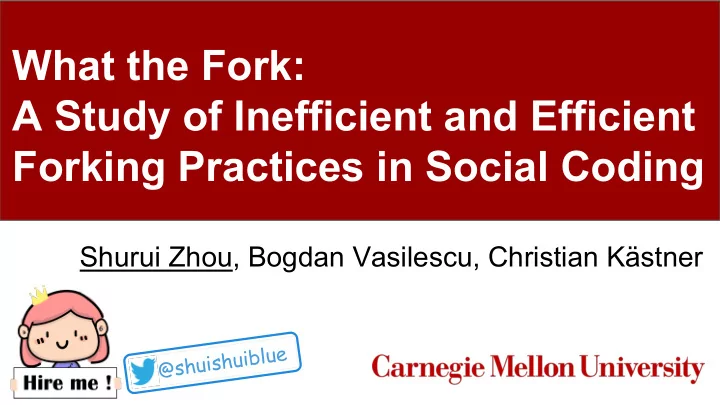

What the Fork: A Study of Inefficient and Efficient Forking Practices in Social Coding Shurui Zhou, Bogdan Vasilescu, Christian Kästner ej @ shuishuiblue
Fork-based Development
Fork-based Development is Popular #Forks #GitHub Projects >50 61704 >500 4787 >1,000 2236 >5,000 198 >10,000 72 >100,000 2 [GHTorrent 2019-06] GitHub Network View
Network View - Lack of an overview
Problems Inefficiency Lost Contribution Rejected PRs Lack of an overview Redundant Development [Zhou et al. ICSE'18] Fragmented Community
Lost Contribution Only 14% of all forks of nine popular JavaScript projects on GitHub contained changes that were integrated back [Fung et al. 2012]
Problems Inefficiency Lost Contribution Rejected PRs Lack of an overview Redundant Development Fragmented Community
Rejected Pull Requests - Demotivating [Steinmacher et al. ICSE'18] - Misalignment with maintainers’ vision of the project
People Follow Different Processes VS
People Follow Different Processes “To a large extent the features are driven by bitcoin improvement proposals, so if I would be looking for a feature, I would go for these proposals” --Bitcoin developer
People Follow Different Processes
People Follow Different Processes VS - Project proposal - Open for any contribution - Resolve issues on the issue tracker
Rejected Pull Requests - Demotivating - Misalignment with maintainers’ vision of the project
Problems Inefficiency Lost Contribution Rejected PRs Lack of an overview Redundant Development Fragmented Community
Redundant Development 23% un-merged PRs were rejected due to redundant dev. [Gousios et al. ICSE'14] Cost of Reviewing [Li et al. MSR'18] De-motivate developers [Steinmacher et al. ICSE'18] Detecting duplicate dev. [Zhou et al. SANER'19]
Problems Inefficiency Lost Contribution Rejected PRs Lack of an overview Redundant Development Fragmented Community
Communities Fragmentation (Hard Fork)
RQ: What characteristics and practices of a project associate with efficient forking practices?
Research Method Interviewing Stakeholders Deriving Hypotheses Literature Search Sampling Inefficiencies Test Quant. Practices Hypotheses Context Factors Modeling
Coordination Mechanism Affects Forking Practices VS - Project proposal - Open for any contribution - Resolve issues on the issue tracker
Coordination Mechanism Affects Forking Practices Centralization makes it easier to coordinate the divisions’ product types but more difficult to take advantage of the divisions’ private information. [Brandts et al. 2018]
Deriving Hypotheses Centralized mgmt ➔ Larger portion of merged PRs Centralized mgmt ➔ Larger portion of contributing forks (6 more in the paper)
Test Hypotheses Sampling Inefficiencies Practices Quantifying Context Factors Modeling
Operationalization - Centralized Management Number of PRs referring to an Existing Issue Measure: All the PRs
Centralized Mgmt → More Merged PRs (R 2 = 27%) Ratio Merged PRs Plus controls for: SubmitterPriorExpr + + SubmitterSocialConn. PR w/ test Centralized Mgmt Modularity (4% of deviance explained) (6% of deviance explained)
Centralized Mgmt → More Contributing Forks (R 2 = 17%) Ratio contributing forks Plus controls for: NumForks + + Size ProjectAge Centralized Mgmt Modularity (18% of deviance explained) (1% of deviance explained)
Evidence-based Intervention For practitioners : - Coordinating planned changes through an issue tracker ? s f f o - e d a r T
Trade-off: Centralized Mgmt Community Fragmentation - + Plus controls for: NumFork Size Centralized Mgmt PR Merge Ratio (12% of variance explained) (35% of variance explained)
RQ: What characteristics and practices of a project associate with efficient forking practices? - Coordination - Modularity
Opportunities to Design Further Interventions - Tooling to navigate and understand changes in forks - Making practices transparent - Cost of community fragmentation
A Study of Inefficient and Efficient Forking Practices in Social Coding Lost Contribution Rejected PRs Lack of an overview Redundant Development Fragmented Community - Evidence-based Suggestions - Further research/tooling directions
Recommend
More recommend